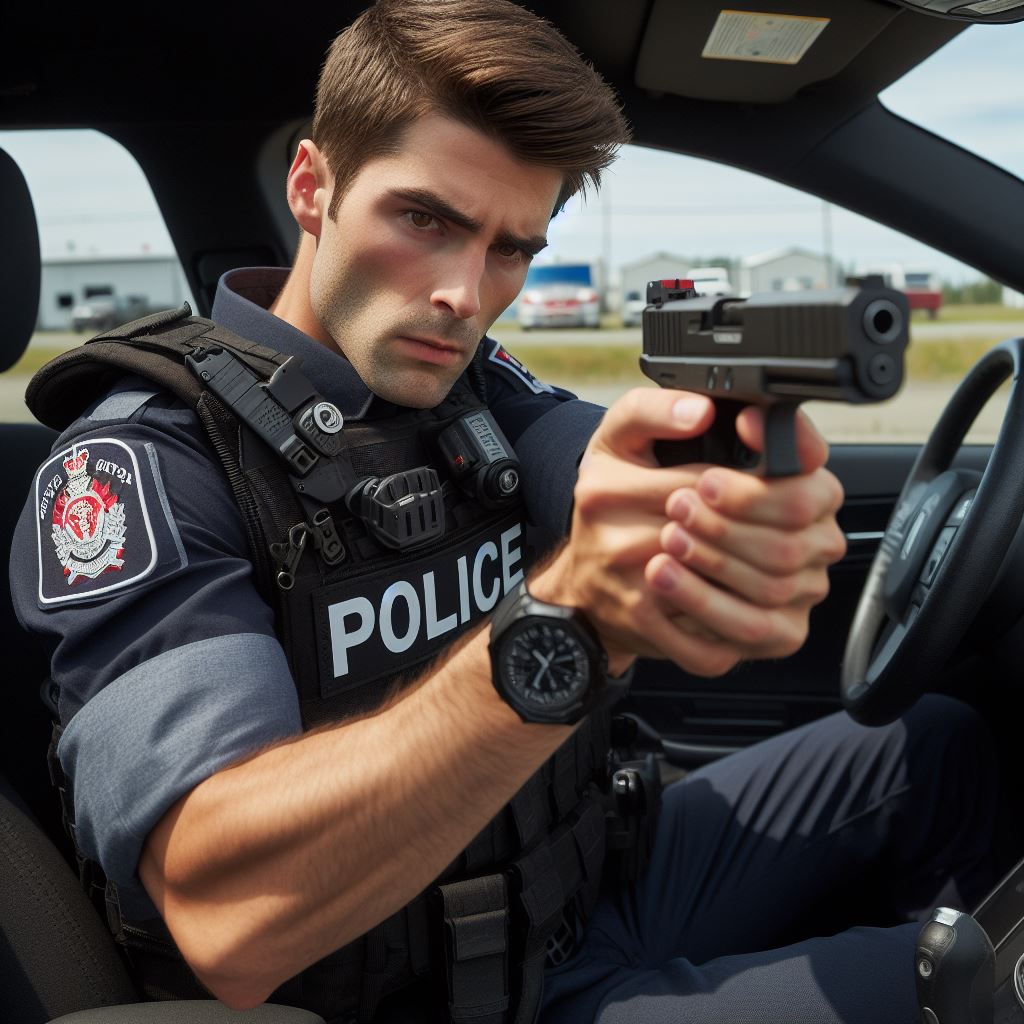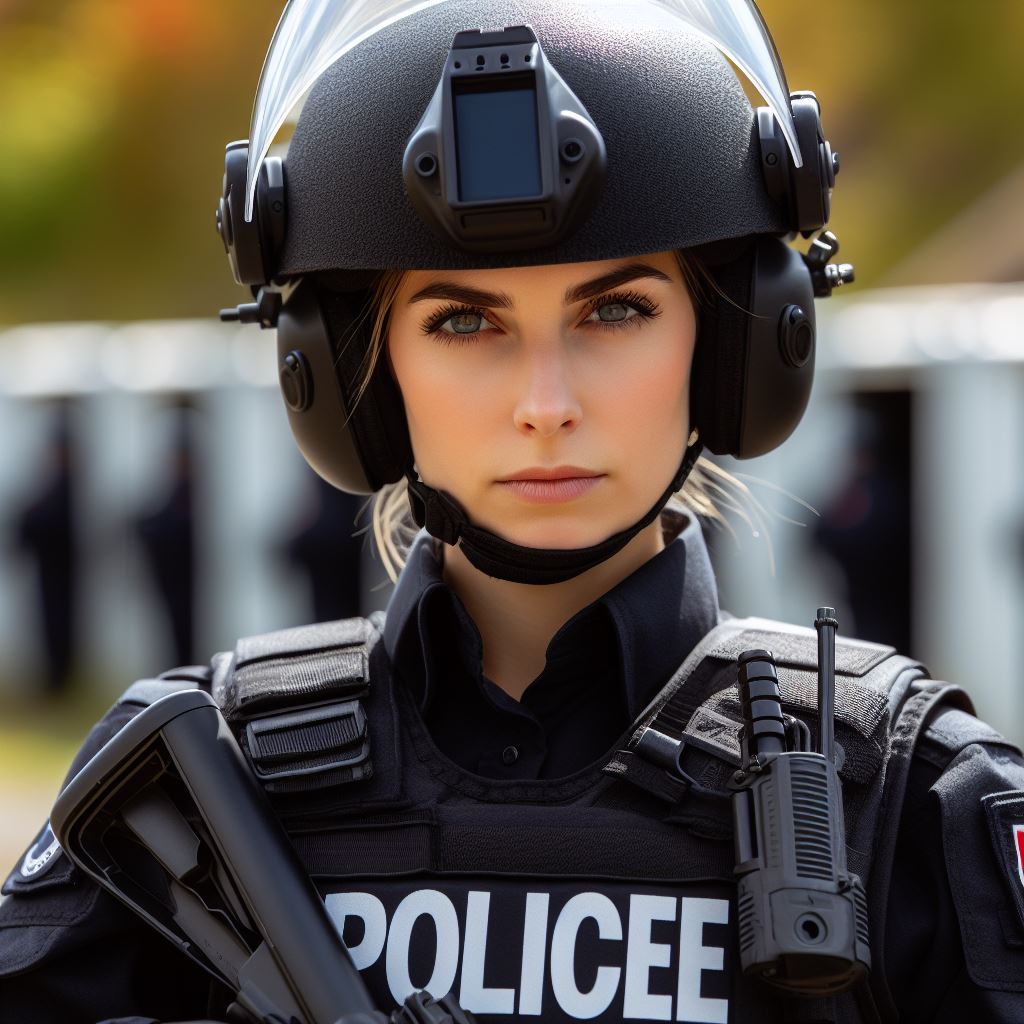Introduction
Canadian police training is an essential aspect of preparing individuals for a career in law enforcement.
Understanding what to expect during this training is crucial for aspiring police officers.
The Importance of Understanding What to Expect During Police Training
Having a comprehensive understanding of what to expect during police training allows individuals to be better prepared mentally and physically.
It enables them to have a clear understanding of the challenges they may face and the skills they need to develop.
Moreover, knowing what to expect during police training helps individuals set realistic expectations and goals for themselves.
This knowledge assists them in making an informed decision about whether a career in law enforcement is the right path for them.
Additionally, understanding the training process allows aspiring police officers to mentally prepare for the physically and emotionally demanding aspects of the training.
They can anticipate scenarios where they need to make quick decisions under pressure while maintaining their composure.
Furthermore, being aware of what to expect during police training fosters a sense of confidence and self-belief.
It helps individuals approach the training with determination and a positive mindset, knowing that they have prepared themselves adequately.
In summary, a clear understanding of what to expect during Canadian police training is pivotal for aspiring police officers.
It allows them to mentally prepare, set realistic goals, and approach the training process with confidence.
By doing so, they can maximize their chances of success and excel in their law enforcement careers.
Overview of the Canadian police training process
Canadian police training is a rigorous and comprehensive process designed to prepare individuals for the diverse challenges of law enforcement.
The training program consists of several stages, each with its own specific goals and objectives.
General structure and duration of police training in Canada
The training process begins with an initial screening to ensure only the most suitable candidates are accepted.
Once accepted, recruits undergo an extensive training program that typically lasts around six to eight months.
Throughout this period, recruits participate in a combination of classroom instruction, physical fitness training, and practical applications.
This comprehensive approach ensures a well-rounded education that covers both theoretical knowledge and practical skills.
Stages and components of the training program
The Canadian police training program comprises various stages, each focusing on specific aspects of law enforcement.
- Classroom instruction: Recruits learn about legal frameworks, investigative techniques, community policing, and ethics.
- Physical fitness training: Recruits undergo rigorous physical training to enhance their strength, endurance, and overall fitness.
- Practical applications: Recruits engage in real-life scenarios, simulations, and role-plays to develop practical skills.
- Firearms training: Recruits receive extensive training in firearm safety, marksmanship, and tactical shooting.
- Emergency response training: Recruits learn how to handle high-stress situations, respond to emergencies, and provide first aid.
Main goals and objectives of Canadian police training programs
The primary aim of Canadian police training programs is to equip recruits with the necessary skills and knowledge to serve as effective and responsible law enforcement professionals.
The training focuses on developing ethical decision-making, communication skills, problem-solving abilities, and teamwork.
Recruits are taught the importance of community policing, maintaining public trust, and upholding human rights.
Physical fitness training is emphasized to ensure recruits possess the physical capabilities required to perform their duties safely and effectively.
Additionally, the training program strives to foster resilience and mental well-being to help officers cope with the demands of the profession.
Unlock Your Career Potential
Visualize a clear path to success with our tailored Career Consulting service. Personalized insights in just 1-3 days.
Get StartedUltimately, Canadian police training programs aim to produce competent and compassionate officers who can confidently uphold the law, protect the community, and contribute positively to society.
In short, Canadian police training is a comprehensive and challenging process that prepares recruits for the diverse demands of law enforcement.
By combining theoretical knowledge, practical skills, physical fitness, and ethical training, the program ensures that officers are well-equipped to serve and protect their communities effectively and responsibly.
Read: The Role of Lobbyists in Canadian Politics
Entrance Requirements and Selection Process
Are you considering a career in law enforcement in Canada? Becoming a police officer requires meeting several specific requirements.
Let’s take a closer look at what it takes to enter this demanding profession.
Basic Requirements
The first step in the process is determining if you meet the basic requirements to become a police officer.
These requirements include educational background, age restrictions, citizenship, and criminal record checks.
When it comes to education, most police agencies in Canada require applicants to have a high school diploma or equivalent.
However, some agencies may prefer candidates with post-secondary education, such as a diploma or degree in a related field.
Age restrictions vary across different provinces and territories, but generally, candidates must be at least 18 years old at the time of application.
Some agencies may have an upper age limit as well, typically around 35 years old.
Canadian citizenship or permanent residency is another basic requirement.
Applicants must be either Canadian citizens or legal residents of Canada to be eligible for police training programs.
Furthermore, prospective police officers must undergo thorough criminal record checks.
This process involves a background investigation to ensure candidates have no criminal convictions or pending charges that would make them unsuitable for a career in law enforcement.
Selection Process
Once you meet the basic requirements, you can move on to the rigorous selection process of becoming a police officer.
This process is designed to identify the most suitable candidates for the profession.
Typically, the selection process involves written exams to assess candidates’ knowledge in various areas, such as law, ethics, and critical thinking.
These exams may include multiple-choice questions or essay-style responses.
Interviews are a crucial part of the selection process, providing an opportunity for candidates to showcase their communication skills, problem-solving abilities, and knowledge of law enforcement principles.
Physical fitness assessments are essential to determine if candidates possess the necessary physical capabilities to perform the demanding tasks required of a police officer.
These assessments may include timed runs, obstacle courses, and strength tests.
In addition to physical fitness assessments, candidates must undergo psychological evaluations to assess their mental and emotional stability.
These evaluations help identify any potential issues that could affect an individual’s suitability for a high-stress profession like policing.
Background checks play a vital role in the selection process.
A thorough investigation is conducted to check candidates’ references, employment history, financial records, and any previous interactions with law enforcement agencies.
Overall, the selection process for becoming a police officer in Canada is rigorous and comprehensive.
It is designed to ensure that the best-suited candidates are chosen to serve and protect their communities.
If you are passionate about law enforcement and meet the requirements, a career in the Canadian police force could be within your reach.
Source:
- “Becoming a Police Officer in Canada” – Police Prep
Read: Canadian Political Scandals: A History
Classroom Instruction and Theoretical Training
Canadian police training focuses on:
- Classroom Instruction: Covering subjects like Canadian law, ethics, human rights, and crime investigation techniques.
- Essential Knowledge: Acquiring vital knowledge and skills for future officers’ duties.
- Canadian Law: Understanding the legal framework for effective law enforcement and justice.
- Ethics and Human Rights: Emphasizing the importance of ethical standards and protecting individual rights.
- Communication Skills: Developing clear and efficient communication with the public, colleagues, and law enforcement agencies.
- Emergency Response: Learning procedures to assess, prioritize, and respond to emergencies promptly.
- Crime Investigation Techniques: Acquiring methods to gather evidence, interview witnesses and suspects, and build strong cases.
- Comprehensive Understanding: Gaining a solid foundation of theoretical knowledge relevant to their profession.
- Critical Thinking: Developing the ability to think critically and analyze complex situations effectively.
- Sound Judgments: Making informed judgments and decisions based on acquired information and knowledge.
- Practical Application: Preparing for the practical application of skills through hands-on experience.
- Contribution to Communities: Equipping officers to excel in their roles and positively contribute to their communities.
Classroom instruction and theoretical training are fundamental in preparing Canadian police officers for their crucial roles in law enforcement.

Physical Fitness Training and Conditioning
When it comes to Canadian police training, physical fitness is of utmost importance.
Candidates must meet specific standards and engage in various physical activities and exercises to ensure they are prepared for the rigors of law enforcement.
Physical Fitness Standards
- Candidates are required to meet a range of physical fitness standards during the training process.
- These standards include criteria such as cardiovascular endurance, strength, flexibility, and overall physical health.
- Physical fitness tests are conducted to assess candidates’ abilities in areas such as running, push-ups, sit-ups, and vertical jumps.
- The specific requirements may vary among police agencies, but all aim to ensure candidates are fit for duty.
Physical Activities and Exercises
- Candidates are put through a series of physical activities and exercises throughout their training period.
- These activities include running, both long-distance and sprints, to improve cardiovascular endurance.
- Obstacle courses are also a part of the training, testing candidates’ agility, balance, and coordination.
- Weight lifting is incorporated to build strength and improve overall muscle tone.
- Endurance training, such as high-intensity interval training, helps candidates develop stamina and resilience.
- Defensive tactics training focuses on improving physical combat skills and agility in real-life scenarios.
Importance of Physical Fitness
- Physical fitness is essential for law enforcement officers to effectively carry out their duties.
- Police officers often face physically demanding situations and must be prepared to respond efficiently.
- Maintaining a high level of physical fitness improves an officer’s ability to handle stressful and challenging circumstances.
- Regular exercise and conditioning decrease the risk of on-the-job injuries and promote overall well-being.
- Physical fitness also has a positive influence on mental health, reducing stress and enhancing cognitive function.
Reasons Behind Rigorous Training
- The rigorous physical fitness training regime is designed to simulate real-life law enforcement challenges.
- It builds resilience and ensures officers are prepared for physically demanding situations they may encounter.
- By undergoing demanding training, candidates develop discipline, determination, and mental toughness.
- The training provides a solid foundation for officers to make split-second decisions and react effectively in high-pressure scenarios.
- Ultimately, the rigorous physical fitness training regime contributes to maintaining public safety and enhancing the reputation of Canadian law enforcement.
Overall, physical fitness training and conditioning are integral components of Canadian police training programs.
The physical fitness standards, activities, and exercises candidates engage in aim to prepare them for the physical demands of law enforcement.
Physical fitness is crucial for officers to effectively carry out their duties and respond efficiently in challenging situations.
The rigorous training regime builds resilience, discipline, and mental toughness necessary for success in the field.
By prioritizing physical fitness, Canadian law enforcement agencies ensure the safety of officers and the communities they serve.
Read: Political Fundraising in Canada: An Insight
Practical Application and Field Training
In the Canadian police training program, practical application and field training play a crucial role in preparing candidates for their future roles as police officers.
This phase of training allows candidates to put their theoretical knowledge into practice and develop the necessary skills and competencies required for effective policing.
Practical Application Phase
The practical application phase is where candidates have the opportunity to apply the knowledge they have gained during the theoretical component of their training.
This phase is designed to bridge the gap between classroom learning and real-life scenarios that police officers encounter on a daily basis.
During this phase, candidates engage in various hands-on activities, simulations, and practical exercises.
They are given the chance to practice their decision-making skills, critical thinking abilities, and problem-solving techniques in realistic scenarios.
These activities are supervised by experienced trainers who provide feedback and guidance to help candidates improve their performance.
It is during this phase that candidates truly begin to understand the challenges and complexities of being a police officer.
Field Training
Field training is another critical aspect of the Canadian police training program.
This phase involves on-the-job training, where candidates are paired with experienced officers and are given the opportunity to shadow them in their daily duties.
During this period, candidates learn by observing and assisting experienced officers, gaining valuable insights into the practical application of their training.
They get hands-on experience in conducting patrols, responding to calls, interacting with the public, and carrying out investigative tasks.
Field training provides candidates with the opportunity to learn from seasoned professionals, ask questions, and gain practical knowledge that cannot be fully acquired in a classroom setting.
It helps them develop the necessary instincts, judgment, and communication skills needed to excel in the field.
Importance of Hands-On Experience
The importance of hands-on experience in the development of critical skills for police officers cannot be understated.
While theoretical knowledge is vital, it is the practical application and field training that truly solidify the learning process.
By engaging in practical exercises and field training, candidates are exposed to real-world scenarios and challenges that they will likely encounter in their future careers.
This helps them build confidence and resilience, as well as develop their problem-solving abilities and decision-making skills.
The hands-on experience gained through practical application and field training also allows candidates to understand the diverse communities they will serve and adapt their policing approach accordingly.
They learn to communicate effectively, build trust, and develop empathy towards the individuals and communities they interact with.
In essence, the practical application and field training phases of the Canadian police training program are essential in shaping competent and effective police officers.
By putting theoretical knowledge into practice and gaining hands-on experience, candidates develop the skills, competencies, and attitudes necessary for successful careers in law enforcement.
Read: The Evolution of Canadian Political Roles
Conclusion
In closing, this blog post has highlighted the key points to expect during Canadian police training.
It is crucial to understand the expectations and requirements of the training process.
By understanding what to expect, aspiring police officers can better prepare themselves physically, mentally, and academically for the challenges ahead.
The training process is rigorous and demanding, requiring individuals to be at their best.
Furthermore, knowing what to expect allows aspiring officers to set realistic goals, manage their expectations, and be fully committed to the training process.
In summary, this blog has emphasized the importance of understanding Canadian police training, as it will shape the future career of aspiring officers.
Aspiring officers should start preparing themselves now to ensure they are fully equipped to meet the demands of the training process.
By taking the time to prepare physically, mentally, and academically, individuals can increase their chances of success and ensure they are fully ready to take on the responsibilities of being a Canadian police officer.




